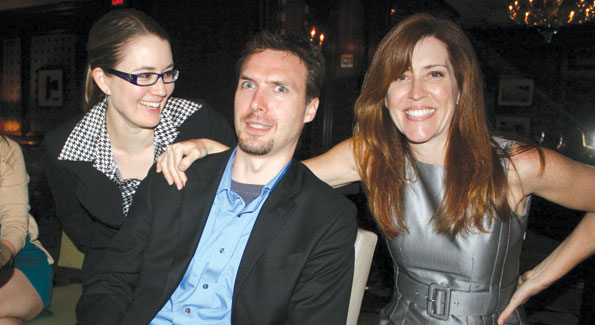‘BULLY’ documentary sounds a nationwide battle call to stop bullying of all kinds.
By Janet Donovan

From left: AFT President Randi Weingarten, 'Bully' director Lee Hirsch and NEA President Dennis Van Roekel (Photo courtesy NEA by Patrick Ryan)
BULLY follows the life of five children and their families through a school year, and confronts bullying’s most tragic outcomes, including the stories of two families who’ve lost children to suicide, and a mother who waits to learn the fate of her 14 year-old daughter incarcerated after bringing a gun onto her school bus.
National Education Association President Dennis Van Roekelm, American Federation of Teachers President Randi Weingarten, and Sundance and Emmy award-winning director and producer Lee Hirsch held an exclusive screening and panel discussion moderated by Washington Post and MSNBC contributor, Jonathan Capehart. “This film,” Hirsch said, “is the culmination of a journey that took three years to make and to build this movement. I was bullied as a kid and felt I needed a film that gave a voice to this experience. The statistics are overwhelming: 13 million children in America experience bullying each year.”
Controversy followed the film when the Motion Picture Association of America gave it an “R” rating based on its use of profanity. Hirsch challenged the ruling and went on to win the battle. “It was a huge blow to us,” he said. “This is really a film for America, a film for families, for teens, for educators. We fought it powerfully. So many voices were heard: 35 members of Congress, Justin Bieber, Meryl Streep, Chris Dodd, Ellen de Generes.” Eventually the MPAA gave it a “PG-13” rating in time for the national release.
“Kids get bullied for a million different reasons,” Hirsch explained. “They get bullied because they’re different, they don’t fit in, they’re smart; it could be anything, their sexuality, their disabilities. There are just so many reasons, but it doesn’t matter, it’s not the victim’s fault.”
The film’s biggest message, the mother of a bullied child said, is to tell people they’re not alone.
A SEARING EXPOSE
Shedding light on big money.
“We’re Not Broke,” or so they tell us.
Karen Hayes is the co-director of the documentary film that explores how multibillion-dollar corporations are able to shift profits overseas and not pay any taxes to the U.S. government. It’s an abuse of power that affects our economy and all Americans across the country right now. The film premiered at the 2012 Sundance Film Festival, and was shown at a private screening in Washington, D.C.
“This differs from other films that we have done,” Hayes says. “It is a whole new realm for us — the corporate tax policy and how corporations are legally able to take advantage of loopholes and end up not paying any taxes to the U.S.” The corporations are able to use accounting practices and use a thing called ‘transfer pricing’ to shift either patents or intellectual property or other things into subsidiaries. The U.S. corporate tax rate is 35 percent, but they’re able to make it so that their tax rate is zero percent.
If that sounds complicated, it is. The questions the film goes on to propose are about why we are essentially subsidizing the corporations in our own country.
“In our film,” Hayes says, “we present how the situation of what’s happening with corporate taxes affects small businesses, and every American in this country. The tax burden falls on the shoulders of the average American, while corporations take advantage by “using our legal system to protect their patents and copyrights.” Asked if there is any hope for a better and brighter America, she said “the premise of our film is that we are not broke. The monies are out there if only there was the political will to collect it.” That, of course, takes us to Congress and we know where that story goes! “It’s a really challenging situation to be up against,” she concluded.





